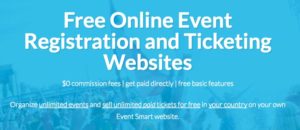What is Search Engine Optimization (SEO)?
According to Wikipedia, SEO is “the process of affecting the visibility of a website or a web page in a search engine’s unpaid results”.
SEO is the process of optimizing your online content so that a search engine likes to show it as a top result for searches of a certain keyword.
Niel Patel breaks it down even further in his post, “SEO Made Simple: A Step-by-Step Guide“.
Research: Find the Right Keywords
You want to uncover keywords that:
- Have a high search volume (people are looking for the keywords)
- Have low competition (smaller amount of results will mean your chances of ranking higher improve)
- Are supported by your content (the keywords are relevant to your site)
The Long Tail
 Popularized by Chris Anderson, the Long Tail describes a phenomenon where lots of low traffic keywords can collectively send you more visitors than a few high-traffic keywords.
Popularized by Chris Anderson, the Long Tail describes a phenomenon where lots of low traffic keywords can collectively send you more visitors than a few high-traffic keywords.
For example, although Amazon may get thousands of visits from the keyword “DVD,” they get millions of visits from all of the individual DVD titles (i.e., Dark Knight, Toy Story, etc.). Individually, none of those titles get anywhere close to the traffic of a term like, “DVD,” but collectively, their volume is a lot larger than any one keyword.
How does the long tail apply to you?
When you combine them all, your long tail (unpopular) keywords should make up roughly 80% of your traffic. So, when you’re researching keywords, don’t just focus on the ones getting massive amounts of traffic. Take note of some of the less popular ones too, and then incorporate them into your overall strategy.
Read the book: The Long Tail: Why the Future of Business Is Selling Less of More
Create Great Content
 After you pick the right keywords, it’s important to start creating your content.
After you pick the right keywords, it’s important to start creating your content.
Search engines have bots that automatically crawl your website, “reading” it to find out what it’s about and then deciding which keywords each of your pages should rank for. You can influence their “decisions” by strategically optimizing your content for certain keywords.
Pay attention to:
- Titles – Create eye-catching titles that raise the reader’s interest. You only have one chance to make a great first impression.
- Keywords – Pick keywords that will help bring people to your site and are relevant. Doing your keyword research up front is a crucial part of the great content you write.
- Links – Link to quality sites that compliment what your website is about. It’ll encourage sites in your niche to link to you as well.
- Quality – [Important] Try to publish unique and quality content. This prompts users to come to your site because they cannot easily find the content elsewhere.
- Freshness – If you are publishing content that does not age or becomes outdated, that’s great, but you also need to add new content on a regular basis. If you don’t have the time to add content to your website, consider adding a question and answer section or a blog to your website. (Hubspot has done a benchmark in 2015 that showed that posting more frequently improves Google rankings.)
And most importantly, do not publish someone else’s content on your site. This creates duplicate content, and search engines can penalize you for it.
Make Use of HTML Tags
 Search engine bots don’t just read your website’s text. They also read your website’s code. So making sure your code is clean and readable is an important part of SEO.
Search engine bots don’t just read your website’s text. They also read your website’s code. So making sure your code is clean and readable is an important part of SEO.
Your WordPress theme should help with most of this. However, I highly recommend a plugin called Yoast SEO. The Yoast SEO plugin provides you with on page/post editing tools that help guide you through the following details.
- Title Tags – Title tags encase the title of your site. To demonstrate, this is the code from eventespresso.com: Event Espresso > WordPress Event Registration Calendar Ticketing Manager PluginHere, Event Espresso puts the emphasis on his name and the name of the site. If you wanted to find it in the search engines, you would probably search for, “Event Espresso” or “WordPress Event Registration” or “WordPress Event Ticketing”. Tip: The Yoast SEO plugin has a built-in tool for titles
- Meta Tags – The main meta tag you should be concerned with is called the “meta description tag.” It doesn’t have much of an impact on your search engine ranking, but it tells visitors what your site is about, so it can have a big impact on whether they decide to click through or not. When creating meta tag descriptions, make sure your keywords are in your description, using full sentences. Don’t make the description too long, though, or it might get cut off. If possible, also try to make each page have a unique meta description. Tip: The Yoast SEO plugin has a built-in tool that adds customizable meta tags.
- Headings – These are very similar to headings in a book, but these come in a specific order. H1, H2, H3, H4, and so on, with H1 starting the page as the main heading. The remaining heading codes descend to lower level headings on the site. For example:
<h1>How to Optimize Your Business for Search Engines</h1>
<h2>The ABCs of SEO</h2><h3>Research</h3>Note the pattern. The more specific your content becomes, the higher the number of the heading. Generally, there should only be one H1 tag on each page, and you can have as many h2s, h3s, and h4s as needed. Also, make sure your headings contain keywords and are relevant to the content on your website. - Site Maps – Sitemaps are like a roadmap for search engines. They give bots directions to all of the different pages on your website, making sure they find everything. There are two types of sitemaps you can create: HTML sitemaps and XML sitemaps. The main difference is XML sitemaps are coded specifically for search engines to read, while HTML sitemaps are easy for people to read too. You can link to them, giving the visitor an overview of everywhere they go. If you have less than a few hundred pages, you should place a link to each page in your HTML sitemap. If your website has a few thousand pages or more, just link to the most important pages. XML sitemaps, on the other hand, contain every page of your website, even if your website has a million pages. You can use tools like the XML Sitemap Creator to automatically create a sitemap for you. Once your XML sitemap is created, you then want to submit it to Google Webmaster Central and Bing so that the major search engines can crawl and index your website. Tip: Yoast SEO has a built-in sitemap generator.
- Domain Name – Domain names that contain keywords within them rank a lot higher than domains without keywords. Exact match domain names rank even higher. But there’s a cost: exact match domains aren’t very unique. The reason why you see many companies use made-up words for their domain name is you can build a brand around it, instead of fighting the existing meaning. Which is better? It depends. If your traffic comes purely from search engines, then using an exact match domain name may be a smart decision for you. For example, Diamonds.com and Hotels.com will always rank well for “diamonds” and “hotels” because their domain name is keyword rich. If SEO is only a small part of your strategy, however, go with something more unique. A decade ago, no one was searching for “Google,” but now it’s a huge brand. The same goes for sites like Zappos and Zillow.
- URL Structure – URLs are another important but often overlooked part of SEO. If your URLs are messy, search engines will have a hard time crawling them, and if search engines have a hard time crawling them, they will not be able to index your site, which means you will not rank in the search engines. Keep these factors in mind to make your URLs more search engine friendly:
- URLs should not contain extraneous characters ( $ @ ! * % = ? )
- Shorter URLs typically rank better than longer ones
- Numbers and letters should only be used in URLs.
- Do not use underscores. Search engines prefer dashes.
- Sub-domains can rank better than sub-directories.
- Site Structure – The way you link to web pages together will make a big impact on your rankings. Here are some tips when cross-linking your website:
- Links within your content tend to carry more weight than links within a sidebar or footer.
- Try to keep the number of links on each page under 100.
- No-follow outgoing links that are not relevant (do not have quality content). For example, links to a Feedburner page.
Other SEOs also talk about no-following internal links, such as to their terms of service, but pagerank sculpting does not work anymore. If you want to block pages such as your terms of service, the best way to do this is to exclude it in your robots.txt file.
- Alt Tags on Images – For search engine bots to properly index images, alt tags need to be added to each image, adding a brief description. For example, if there was an image of a “blue widget”, I would tell the search engine that the image is a blue widget by using an alt tag. It would look something like this:<img src=”http://quicksprout.com/images/bluewidget.jpg” alt=“blue widget” />
In addition, make sure your image names are relevant to the image. The picture of the blue widget would be called bluewidget.jpg instead of image3.jpg.
Links
Links are maybe the most important part of SEO. The more websites that link to your website, the higher your web pages will rank.
The reason links have a high value in SEO is that it is easy for anyone to do research, modify their content, or create content, but is hard to convince hundreds or thousands of websites to link to you. In the eyes of a search engine, the more trustworthy, non-spammy sites are linking to you, the more authority you must have on the topic.
Here are some things you need to know. In general:
- Links within content are more effective than links in a sidebar or footer
- Links from related sites are better than links from non-relevant sites
- Anchor text plays the most important role in link building. If you want to rank for “blue widget” then you want the anchor text of the link to be “blue widget”.
Here are some things to avoid:
- Links from spammy or irrelevant sites.
- Site-wide links can hurt more than they may help.
- If all of your links are rich in anchor text, it can hurt you.
- Reciprocal links (I link to you and you link to me) are not too effective.
- If you buy text links and get caught, you can get banned from a search engine.
Here are a few ways you can increase your link count:
- Social media – getting on sites like Digg or StumbleUpon don’t just drive a ton of traffic. The increase in visibility also improves your chances of getting linked to.
- Directories – There are many directories on the web. Take the time to submit your website to the ones that compliment your content.
- The top 100 – If you want to rank for a specific keyword, the best links you can get are from sites that already rank in the top 100 search results for that keyword. Granted, some of the sites that rank for the term you are trying to rank for are your competitors, so they will not link to you, but some will not be your competition and you can always shoot them a nice email asking them to link to you.
- Forums – Many forums allow you to create signatures, in which you can link back to your website. As long as those links are not no-followed, they will help with your rankings.
- Competition – The easiest way to get links is to see who links to your competition and write them an email telling them the benefits of your website compared to your competition. Roughly, 5% of the websites you email will also add your link.
- Dead links – There are billions of links on the web, so expect a good portion of those links to die over time. Websites go down and many of the links pointing to that website are still active. If you email those websites informing them of the dead link, and that your content is similar, there is a good chance they will replace the dead link to one going to your website.
Conclusion
 Be patient.
Be patient.
It takes time for search engines to update their records, as they have to crawl billions of websites.
Also, note that it will take time to figure out what works for your site. What works for site A might not work for site B. There aren’t any shortcuts. If you do anything shady to speed things up, eventually you will get caught and punished. It’s never worth it.
A better approach?
- Figure out what people are looking for
- Create a site that gives it to them
- Optimize for search engines, so they help people find you
It’s not just smart SEO. It’s what search engines want you to do.
Ultimately, their goal is to have the best websites for every given topic show up at the top. So if you work hard to create the best website, and then promote it effectively, eventually they will catch up.
Just keep the above points in mind to help guide you. It takes time, and it’s a lot of hard work, but if you stick with it, it does pay off.
Further Reading
Newsletter Signup
Join the EventPresser Newsletter today! I promise we won't send you spam or send you special offers for crap you don't want.

